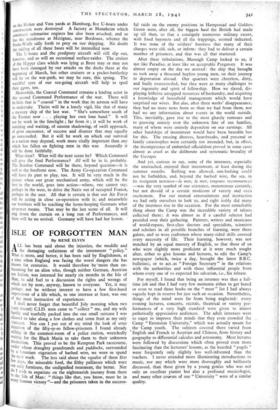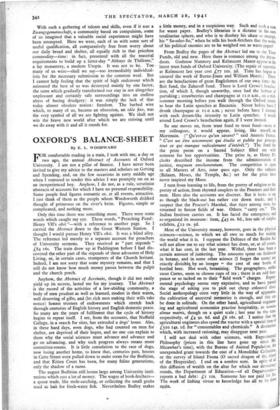ISLE OF FORGOTTEN MAN
By RENE ELVIN LL has been said about the injustice, the muddle and the damaging unfairness of the internment " policy." What is more, and better, it has been said by Englishmen, at a time when England was facing the worst dangers she has known for centuries. It would therefore be more than un- becoming for an alien who, though neither German, Austrian nor Italian, was interned for nearly six months in the Isle of Man, to add fuel to a discussion the rights and wrongs of which are by now, anyway, known to everyone. Yet, it may perhaps not be without interest to have a few first-hand impressions of a life which, to one internee at least, was one of the most instructive of experiences. I shall never forget that beautiful July morning when two (very decent) C.I.D. men came to " collect " me, and my wife IlastilY and tearfully packed into the one small suitcase I was allowed to take along a few clothes and some fruit as my only viaticum. Nor can I put out of my mind the look of utter dejection of the fifty-or-so fellow-prisoners I found already milling in the common-room of a police station, wretchedly Waiting for the Black Maria to take them to their unknown destination. This proved to be the Kempton Park racecourse, under whose draughty grandstands and paddocks, surrounded by a luxuriant vegetation of barbed wire, we were to spend the next week. The less said about the squalor of these first few days, the miserable food, the filthy palliasses which were an dOnly furniture, the unignified treatment, the better. Nor
do I wish to expatiate on the nightmarish journey from there
to the Isle of Man: " things like that, you know, must be in every famous victory"—and the prisoners taken in the success- ful raids on the enemy positions in Hampstead and Golders Green were, after all, the biggest haul the British had made up till then, so that a condignly numerous military escort, with fixed bayonets and all the trappings, seemed indicated. It was none of the soldiers' business that many of their charges were old, sick, or infirm: they had to deliver a certain number of prisoners, and that was all that mattered.
After these tribulations, Mooragh Camp looked to us, if not like Paradise, at least like an acceptable Purgatory. It was almost empty on the day we arrived: the ship that brought us took away a thousand hapless young men, on their journey to deportation abroad. Our quarters were cheerless, dirty, and badly overcrowded, but they were as many challenges to our ingenuity and spirit of fellowship. How we slaved, dis- playing hitherto untapped resources bf husbandry, and acquiring a knowledge of household management which would have surprised our wives. But alas, after three weeks' disappearance, they had no more news from us than we had from them, nor had we any information about events in the world outside. This, inevitably, gave rise to the most ghastly rumours and to gnawing anxiety over the unknown fate of our families, many of whom were entirely dependent on our earnings. All other hardships of internment would have been bearable but for this. The ensuing distress, heartbreaks, and personal or family catastrophes were certainly not intended, but, in effect, the incompetence of embattled officialdom proved in some cases almost as cruel as the deliberate and systematic brutality of the Gestapo.
And yet, curious to say, some of the internees, especially the unattached, enjoyed their internment, at least during the summer months. Bathing was allowed, sun-bathing could not be forbidden, and, beyond the barbed wire, the sea, in its evergreen newness—la mer, In mer, toulaurs recommencde —was the very symbol of our existence, monotonous certainly, but not devoid of a certain modicum of variety and even excitement. For our mutual entertainment sand instruction we had only ourselves to look to, and right nobly did many of the internees rise to the occasion. For the most remarkable thing about the Camp was the incredible variety of talents collected there: it was almost as if a careful selector had presided over their gathering. Painters, writers and musicians of world-repute, first-class doctors and specialists, scientists and scholars in all possible branches of learning, were there galore, and so were craftsmen whose many-sided skills covered every necessity. of life. Their learning, however, was not matched by an equal mastery of English, so that those of us who were slightly more proficient at it were much sought after, either to give lessons and lectures, to edit the Camp's newspaper (which, twice a day, brought the latest B.B.C. bulletins), or to act..as " Foreign Secretary " in the relations with the authorities and with those influential people from whom every one of us expected his salvation, i.e., his release.
For myself, I found that being an internee was thus a full- time job and that I had very few moments either to get bored or even to read those books on the " must " list I had always vaguely kept in reserve for just such an occasion. Nevertheless, things of the mind were far from being neglected: every evening lectures, concerts, recitals, theatrical or variety per- formances of a very high standard were given to almost pathetically appreciative audiences. The adult internees were so eager to improve their minds that they even crowded the Camp " Extension University," which was actually meant for the . Camp youth. The subjects covered there varied from English and French to Assyrian and Chinese, from history and geography to differential calculus and astronomy. Most lectures were followed by discussions which often proved even more fascinating than the lecturers' lessons, as the bearded " pupils " were frequently only slightly less well-informed than the teachers. I never attended more illuminating introductions to music, nor any which were more thoroughly and brilliantly discussed, than those given by a young genius who was not only an excellent pianist but also a profound musicologist, and many other courses of our " University " were of a similar quality. With such a gathering of talents and skills, even if it was a Zwangsgemeinschaft, a community based on compulsion, some of us imagined that a valuable social experiment might have been attempted. Here we were, each of us with some sort of useful qualification, all comparatively free from worry about our daily bread and shelter, all equally rich in that priceless commodity—time: in fact, presented with all the material requirements to build up a latter-day " Abbaye de Theleme," a lay monastery, a modern Utopia. It was not to be. Too many of us were—shall we say—too irremediably individual- istic for the necessary submission to the common weal. But I cannot help feeling that the spirit of high endeavour which animated the best of us was destroyed mainly by one factor, the same which gradually transformed our stay in not altogether unpleasant and certainly safe surroundings into an endless abyss of boring drudgery: it was simply the lack of that today almost obsolete notion: freedom. The barbed wire which, to many of us, became an obsession, an idee fixe, was the very symbol of all we are fighting against. We shall not win the brave new world after which we are striving until we do away with it and all it stands for.































 Previous page
Previous page